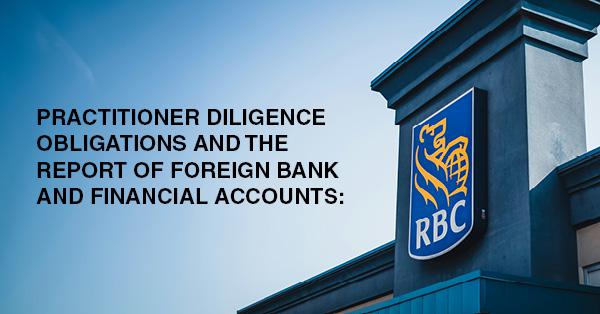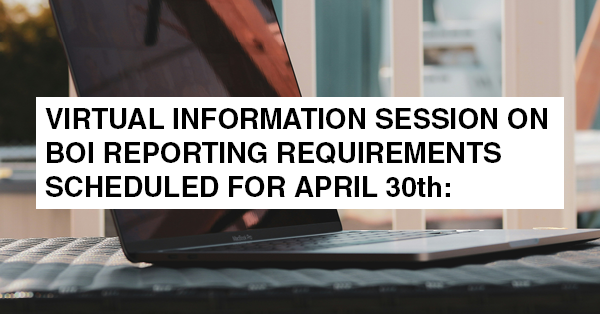PRACTITIONER DILIGENCE OBLIGATIONS AND THE REPORT OF FOREIGN BANK AND FINANCIAL ACCOUNTS:

Tax practitioners are subject to the standards of practice and disciplinary rules of Circular 230, Regulations Governing Practice before the Internal Revenue Service, which was issued under 31 CFR Subtitle A, Part 10. This article addresses the professional responsibility of practitioners concerning the Report of Foreign Bank and Financial Accounts (FBAR).
I.FBAR in General
The FBAR, FinCEN Report 114, is an information report required by the Bank Secrecy Act, 31 U.S.C. § 5314, and related regulations in 31 C.F.R.§ 1010.350. Although the FBAR is not a tax return, it is referenced in U.S. returns, such as Form 1040 Schedule B, which includes checkboxes to answer questions about foreign financial accounts. Similar questions and boxes are incorporated into Forms 1041 (U.S. Income Tax Return for Estates and Trust), Form 1065 (U.S. Return of Partnership Income), and Form 1120 (U.S. Corporation Income Tax Return) (Schedule N). Reporting of foreign bank or financial accounts is required of:
- United States persons who have a financial interest in, or signature or other authority over, a financial account in a foreign country; and
- The aggregate value of the account or accounts exceeds $10,000 at any time during the calendar year.
These individuals and entities must report their foreign accounts by (1) completing the applicable sections of U.S. tax or information returns, and (2) filing FinCEN Report 114.
When a person required to file an FBAR does not file the report, the person is potentially subject to civil and criminal penalties for non-filing. Civil penalties apply to both willful and non-willful violations.
II. IRS FBAR Enforcement Efforts
On September 8, 2023, the IRS issued IR-2023-166, which announced a “sweeping effort to restore fairness to tax system with Inflation Reduction Act funding.” Among the targets of the IRS’s enhanced efforts are FBARs, about which IR-2023-166 states:
High-income taxpayers from all segments continue to utilize Foreign Bank accounts to avoid disclosure and related taxes…. IRS analysis of multi-year filing patterns has identified hundreds of possible FBAR non-filers with account balances that average over $1.4 million. The IRS plans to audit the most egregious potential non-filer FBAR cases in Fiscal Year 2024.
III. Tax Professionals’ Role in FBAR Compliance
To fulfill their obligations to clients and to tax administration, practitioners (including tax return preparers in the IRS’s Annual Filing Season Program) must meet certain standards prescribed in Circular 230.
- Diligence
Practitioners who prepare Forms 1040, 1065, or 1120 for clients have a duty of diligence under Circular 230 to inquire of their clients with sufficient detail to ascertain the information necessary to prepare correct responses to the foreign-account questions on the clients’ tax returns. The level of diligence required is set out in section 10.22(a) of Circular 230, which requires that a practitioner exercise due diligence in preparing and filing tax returns or other documents on a client’s behalf with the IRS and in ensuring that the practitioner’s written or oral statements to clients and to the IRS are accurate.
- Knowledge
For purposes of due diligence, section 10.34(d) allows a practitioner to generally rely, in good faith and without verification, on information from a client. Good faith reliance, however, contemplates that a practitioner will make reasonable inquiries of a client who provides information that indicates possible overseas holdings subject to FBAR requirements. Thus, while a practitioner may accept the client’s responses at face value if it’s reasonable to do so, the practitioner may not ignore the implications of information the practitioner knows or has received from the client. If the information from the client appears to be incorrect, incomplete, or inconsistent with other facts the practitioner knows, then the practitioner must make further inquiry of the client for an explanation.
Additionally, if a practitioner learns that a current client did not comply with requirements for reporting foreign accounts for past tax years, the practitioner must, under section 10.21, promptly inform the client of the “noncompliance, error, or omission” and any penalty or penalties that may apply.
- Standards for tax returns and other documents
When a practitioner assists or advises a client in reporting income or other items on a tax return or as to positions taken on a return, standards in section 10.34 apply to the practitioner’s activities. Section 10.34(c) requires a practitioner to advise a client of any potential penalties likely to apply to a position taken on a tax return the practitioner prepares for the client or when the practitioner has advised the client about the position taken. A practitioner must also inform the client of any opportunity to avoid any the penalties through adequate disclosure.
In the FBAR context, a practitioner acting as a preparer or advisor to a client may determine that one or more foreign accounts exist that must be reported in designated places on the client’s tax return. If so, the practitioner should prepare the return or advise the client accordingly. The practitioner is not obligated to prepare the FBAR form for the client unless the practitioner feels competent to do so and the client has agreed to this additional service. Nevertheless, the practitioner does have an affirmative obligation to advise the client of the need to file an FBAR and the consequences of failing to file.




